Travel Supplies for Europe
Small Stuff Packing List
Calculator, compass, guide books, maps, Swiss Army Knife, TP, watch, wire ties, electric plug adapters.
Carpe diem. Vivere bene! Gratia Deo.
HOW TO EUROPE: The Complete Travelers Handbook - - Chapter 6.3: Travelers Supplies - -
This entire book is placed on-line gratis by the author, photographer, and webmaster. That's me, John Bermont. My DIY project comes with help from my daughter Stephanie. I welcome questions, comments, and complaints.
Last update . For contact information please see Your Blow Back at the foot of this page.
Load your wagon — NOT!
This Internet edition of chapter 6 is divided into four parts because it is so big. The four parts are:
- Pack Light Field Test: Travel Europe in Comfort and Style.
- Personal Care Items: Packing Your Toothbrush.
- Travel Supplies: Pack a Bunch of Small Stuff.
- Packing Valuables: Not in Your Luggage.
After the Pack Light Field Test and a gathering of your toothpaste, lipstick, etc., it's time to identify other things that will come in very handy as you travel. Again, this is stuff that you have around the house that you wouldn't think twice about on a regular day. However, the day that you fly to Europe is not going to be a regular day. Be prepared.
TRAVELER'S SUPPLIES
Not everybody will need all the things in the following lists. Look them over and consider the accompanying explanations.
Two Dozen Little Things
There are a couple dozen items to consider bringing with you in order to make your travels comfortable and enjoyable. This may look like a lot of gadgets and stuff, but most of it is small and light. All of it fits into one of those little 8"x6"x3" mesh travel sacks.
Liquids are critical for checked bags and especially for carry-on luggage. Liquids are a safety and security issue on airplanes, big time. See the 3-1-1 Liquid Packing Rule section of part 2. Do it right or throw it away, or watch the TSA inspector grab your precious stuff with his blue gloved hand and throw it away for you.
I have only two liquids on this list, vinegar and vodka. As discussed in part 2, shampoo, deoderant, and mouthwash can be left out of your life whether you are traveling or not. Assuming that you are traveling light per chapter 7, Luggage for Europe: Pack Light and Let It Roll, you might need to make a quick trip to market for some vinegar after your plane lands in Europe. Finding a 3 ounce bottle of anything, much less a commodity like vinegar, is nearly impossible. But see the "Travel Bottle Set" below. You can pour your own vinegar into one of the 3 ounce bottles of this bottle set. The optional liquids, tanning lotion and IPA, can be purchased in Europe if you want them. Vodka is free on the plane. Whoa! Did you say free booze? You bet. Read on.
Alarm chronograph: A digital "alarm chronograph" is a wristwatch of ultimate utility to the traveler. These watches feature at least a half dozen functions, including: time, time in another time zone, chronograph (a.k.a. stopwatch or elapsed time meter), date, day of the week, alarm clock, and night light. Some include miniature calculators. When buying an alarm chronograph, go through all the motions with the experienced sales clerk so that you know how to use it. Instruction books with these watches are notoriously difficult to follow. The battery will last 6 to 12 months. It may not be possible to find equivalent batteries overseas and it's very difficult to change batteries yourself. If in doubt about whether the battery will last through your trip, waste the few dollars and have a jeweler change the battery before departure. If it's water resistant you can wear one of these watches while swimming and showering. These are tough items, but my last one didn't quite make it through a snow blower.
Bungee cord: I use a bungee cord to secure my shoulder bag to the frame of my roller bag when I am on the move in airports, train stations, and city streets. This prevents the shoulder bag from flopping around which would otherwise destabilize the roller bag and tip it over. That usually happens at times the mishap does the most to ruin your day — when you are running to catch a train or plane. I always keep a small bungee cord in an outside pocket of my luggage.
Business cards: Business cards are very handy. They save you the trouble of writing your name and contact information on a scrap of paper when you meet an interesting person. They imply special status in life and sometimes get you through doors where you normally wouldn't be allowed.
They make great luggage tags also. I use wide clear tape on both sides of a card, punch a hole on one edge, and then attach it to my bags with a wire tie (see below). I attach one inside also in case the outside tag should disappear.
You can print your own rather than use your company cards. Design anything and put anything you want on them. The brand Southworth produces fine business cardstock that you can print from your computer. Print out a sheet of 10 at a time, split them along the micro cut, and bingo you have a professional calling card. I normally carry two versions and use them as the situation calls for, chemical engineer or travel writer. I am both.
Calculator: If you are traveling through a lot of countries, a credit card size electronic calculator is very handy for converting the cost of goods and services into American dollars so you know how much you are spending. It is not difficult to get confused when you are in a different country every other day. Even though 16 countries of central Europe have adopted the euro as their common currency, 30 other countries including Britain, Switzerland, and Denmark have not. None of the eastern European countries have adopted the euro, though it is widely circulated and accepted by merchants from Tallinn, Estonia to Istanbul, Turkey and beyond.
A calculator is also a powerful tool when you are negotiating for a lower price in hotels and shops. In Europe, almost everything is negotiable. Your calculator is a strategic assistant and it shows the hotel keeper or merchant that you are a formidable shopper. Play dumb. Heck, you don't know what 89 euro or 52 krona is worth in terms of your paycheck. Pull out your calculator and do the math. Then meditate for a little bit so you can give the merchant time to think. He is thinking whether he wants to make this sale at a 30% discount, or no sale? Keep in mind that some shops and restaurants have "tourist prices," charging 25% or more extra to people who are not regular customers. Hotels make no bones about it with "in-season" or "high-season" dual pricing. Hotels are probably the easiest places to negotiate and are also the places with the highest profit potential for travelers. See chapter 14, Hotels, Hostels, B&Bs, Private Homes: European Travelers' Sleep Options to learn how to negotiate any hotel down by 20% or more, even 50%.
Can opener: Although the Swiss Army Knife mentioned below has a can opener, you may want to avoid the risk and effort required to use that feature. Due to frustration with my Swiss Army knife can opener I have started carrying a regular can opener. These are small and certainly make it easier and safer to open a can of tuna. I loaned my Swiss Army knife to a fellow on a train years ago so he could open a can of something. I still remember the bleeding gash when it slipped on him and cut his thumb open.
Coffee beans: Chew on a bean for a quick perk up when it's not convenient to get a cup of coffee. If you don't like grit in your mouth, swallow the bean whole. Caffeine is a handy cure for mild headaches. Dark chocolate is also an alkaloid source if you don't like coffee. My favorite is chocolate covered coffee beans. Double whammy. Get them from Dean's Beans.
Coin purse: When traveling around a lot, you need something to keep the coins of each country separate. A coin purse with several pockets would do. Or use a disposable latex glove and slip coins of different countries in different fingers.
Compass: Since you won't often be able to see the North Star, one of these guys comes in very handy very often. It saves a lot of steps walking to corners and checking street signs, which are always missing when you need them the most, just like cops and cabs. Make sure that a big chunk of metal does not interfere when making a reading.
Condoms: Besides the intended purpose, use these to hold your toothbrush, soap, coins, and other odds and ends. They also come in handy as water balloons during civil disturbances.
If you are engaged in one night stands you will want to bring condoms for their original purpose, and to help prevent any STDs from entering your body. You only have one body and it only takes one mistake to screw it up permanently. BTW, the etymology of the word scumbag is condom. Just thought you would like to know.
Dictionaries, guidebooks, and maps: There are more bad guidebooks than good ones so chose with care. A bad guidebook can ruin your trip. A detailed discussion of recommended literature for the road is in chapter 10, Guide Books and Maps: Tomes for European Travel.
Earplugs: Sometimes you don't know you have a disputatious room until midnight. Carry a few packets of foam rubber roll-up earplugs for those noisy nights. These might also come in handy on the plane. There is usually a baby on board within earshot, and pilots sometimes get diarrhea drawl over the loudspeaker just as you are falling asleep.
Electrical devices: Electricity over there is 220 to 230 volts, twice as high as in the USA. This is a continuing challenge. A list of electrical devices and intelligence on European electricity is in chapter 11, Electricity in Europe: Voltage, Frequency, Power. Plugs, Adapters, Converters.. Don't singe your stuff or yourself.
Emery boards: You'll have plenty of time on the plane to get your nails in shape. However, one of my correspondents wrote that he finds this in poor taste and that "attending to personal grooming should be done in the privacy of the lavatory." Be discreet, at least.
Envelopes: To help keep your receipts in order a couple of business size envelopes is handy. I put receipts for cash and credit card expenditures in one and train tickets and reservations in the other, in chronological order. A few smaller envelopes are handy for city bus and metro tickets, hotel cards, and phone cards. Stay organized and keep a financial record of your travels. Heck, write a travel story and deduct the entire cost of your trip. Note that this is not tax advice! Anybody could write a better story than an "educator" who recently got his stuff published in our local newspaper. He didn't even know the metric system and didn't know that his cruise ship went through the Dardenelles, historically one of the best known waterways in the world. I guess they stopped teaching geography 40 years ago.
Flashlight: Bring a mini light operating on AA cells. A penlight is slightly bigger than a felt tip marker and throws a good beam. An LED light is very good and doesn't run down the batteries as fast. If traveling by auto, carry a big heavy duty flashlight.
Test your flashlight now and then to make sure the batteries are always good. To get longer life out of your batteries carry the flashlight in a small zip-type plastic baggie to keep it dry. Replacement batteries are available throughout Europe.
British use the word "torch" for flashlight.
Hand soap: You will appreciate having a bar of your favorite hand soap as you travel. Not all hostels and dormitories have soap, and B&Bs and hotels may have something not to your liking. I prefer that green stuff, Irish Spring®. Hand soap can also be used for shaving if you are put off by my vinegar suggestion below. After showering do not dry your face, or whatever part of your body you intend to shave. Run some hot water and get the area good and soapy. It softens the hairs and lubricates the skin. Shaving with a safety razor is much faster than with an electric shaver.
Magnifying Lens: Maps, phone books, schedules, and other items of interest to travelers often have microscopic print. A magnifying lens is very helpful.
Mirror: Slip an old CD in your toilet kit. The underside makes a handy, good-enough, safe, and very lightweight mirror.
Nail clippers: Besides the obvious you can use these to clip the security wire tie on your luggage on arrival. See below. I prefer the big size. It works on fingernails also. Contrary to some reports, nail clippers can be carried on the plane.
Paper bags: Nab a few bags when you see them. Paper bags preserve fruit much better than plastic bags, the common bagging material in Europe. You may want an orange or banana in the morning and you will not want to pay the hotel price.
Paper clip: Bring a big one in your pocket to clip your napkin to your shirt while eating on the plane. The eating position on a plane lends itself to drips of salad dressing and sauces on your shirt. A paper clip will hold the napkin in place.
Paper towels: Take a few extra towels from the restroom on your plane or train, fold them up, and keep them in your hip pocket or purse. Washrooms in Europe are not always supplied and these will come in very handy.
Photo equipment: A discussion of travel photography, digital and film cameras, and other equipment is presented in chapter 12, Photography in Europe: Travel with Your Camera. If you have a digital camera study the manual. If you have a digital SLR camera study the manual and take a short course to learn how to use the features. These babies are complicated. Bring the user's manual with you, the part that is in your language.
Plastic bags: Bring a dozen Ziploc® baggies, in the sandwich, quart, and gallon sizes. They can be used to carry soap, lotions, dirty clothes, and miscellaneous small items. Squeeze out the excess air just before sealing so they don't waste too much room in your suitcase. You can save money with the similar plastic bags sold under store brands.
Another handy bag is a one-gallon size plain bag with a twist-tie closure. These are much cheaper than the zip-type bags and do almost the same job. Low budget travelers can use bread wrappers or grab a few plastic bags from the roll in the produce section of your home supermarket.
The two gallon size Ziploc® bags are great for packing clothes. Each will hold a couple pairs of slacks, a few shirts, or a suit. Fold your clothes neatly — do not roll them unless you want to look like a frump. After putting your clothes in the bag, zip it almost closed, lay it on your bed or a soft chair, and sit on it to squeeze out the air. Then zip up the last inch. Your clothes become "vacuum packed" and easy to arrange in your luggage. Sometimes you have to show the contents of your suitcase or backpack to a customs officer. If everything is in Ziploc® bags, just turn your luggage upside down and dump everything out in front of him. The look on the guy's face is a travel moment. I chuckle every time I think about the day I did this. That was about 10 years before those custom designed vacuum storage bags came on the market. There is nothing wrong with those, except the price.
Write your name, phone number, and email address on each bag with a water proof felt tip pen.
Another good use for baggies takes advantage of their ability to hold air. Simply give them a couple lungs of air, zip them up, and tuck them in the voids. I used them once to pad a suitcase chuck full of champagne, which I successfully carried as checked baggage from California to an eastern state which must remain nameless because it was illegal to bring alcohol into that state without a license. I didn't have no stinking license. [phrase borrowed from the film 'Treasure of the Sierra Madre' — Humphrey Bogart's greatest performance.] Here it is 2013 and it is still illegal to bring a bottle of beer into Michigan. The politicians need to protect the profits of those liquor distributors, and the liquor distributors support those politicians.
Ziploc® bags are also handy for making ice balls to keep your groceries and beverages cool. Fill a couple with water and put them in the freezer.
A one quart Ziploc® type bag is now required if you are bringing liquids into the passenger section of the airplane. See the Security section of Flying to Europe: Travel Starts at the Airport.
Plastic utensils: A few plastic spoons, forks, and knives will help you picnic. I haven't found a way to carry plastic cups without breaking them. Most hotel rooms and overnight train cabines have a glass or two anyway. At other times I just drink my wine from the bottle. But I check for dregs first. You will not like the taste of that sendiment.
Portable radio: A miniature AM/FM radio is nice company. Most of the budget hotels now have TV in the rooms, but very few have radios. In Britain you can understand everything. On the Continent, tune in to one of the BBC stations (excellent humor) or American Armed Forces Network (football, top forty, etc.). Unfortunately, Radio Luxembourg (rock and roll with English disk jockeys) went silent in 1992. It was the greatest and could be heard throughout northern Europe. It has come back on several Digital Radio/DRM frequencies, and it has an active website with streaming of its radio output. On local radio in Europe you are likely to hear the original version of American popular music, mixed in with politics and classical compositions. On the trains the AM band is all static but the FM stations come in clear as a bell. My radio is smaller than a deck of cards and has a stereo head phone jack but no speaker. Perfect.
Instead of a radio you can bring your iPod. Teenagers are no longer hauling around a CD player and a case of CDs. An iPod or Zune is a fraction of the size of a CD player and case and can be loaded with thousands of tunes.
Rubber bands: Grab a few of those fat rubber bands from the office. They are great for getting a grip on things, like pickle jar lids. If you don't work in an office use the blue ones that hold asparagus bunches together.
Safety pins: One of these can come in handy now and then. Put a few in your sew repair kit.
Snack bag: To avoid the atrocious prices and mediocre food in most American airports pack a sandwich and a drink to tide you over the couple of hours that you will be waiting for your plane to depart. Your airline will request that you arrive 2 to 3 hours before departure. Most of this time will be wasted, but it is necessary for security clearance.
In Europe carry a chocolate or granola bar for emergencies. Partially dried fruit like apricots, prunes, or dates are great for snacks. A spoonful of peanut butter or almond butter can keep you going for a couple of hours. A can of tuna or sardines might come in handy now and then. Always carry something with you in case everything is closed when your train arrives. If you are arriving late in the day or on a Sunday take advantage of the market that you may find in the train station because the regular grocery stores in most cities normally close by 6 PM or 8 PM.
Sun screen a/o tanning lotion: If you are going to southern Europe during the summer you might want to pack a bottle of your favorite sun screen. If you are going to do some beach time maybe you want tanning lotion. Olive oil works for me, at half the price. All of these can be purchased in Europe.
Swiss army knife: Don't leave home without it. This is a superbly engineered and manufactured item. Get one with the scissors, corkscrew, and screwdriver blades as a minimum. Be careful and have a lot of patience with the can opener if your knife has one. Some European corks are very tight so if you are weak in the pulling department buy a folding bartender's corkscrew in any wine shop. It's a practical souvenir, also.
There are two brands of "official" Swiss army knives — Wenger and Victorinox. Each brand has scores of models. Don't waste your money on a cheap thing made by children in China.
As you know, regulations prohibit knives in airline carry-on luggage so you will have to put this knife in your checked luggage (if any) or buy a knife as soon as you land. If your first stop is Switzerland, you are in luck. You will have a much greater selection and will save money. You might also buy your alarm chronograph over there. The Swiss are known for precision watches. In some stores you see economy watches laid out like bananas.
Tape measure: When shopping for something to fit, a small tape measure will help. A cloth tape from a sewing shop is excellent.
Telescope/binoculars: A telescope or binoculars can be very useful in examining gargoyles on cathedrals and bullet marks on the sides of castles. There are some good quality small glasses available at camera shops. For a different view of things get a pair of night vision gogles.
Toilet paper: Public restrooms in most of Europe are usually supplied but not often in Spain and Portugal. Even in Holland and Germany you sometimes discover an empty TP holder, after you paid to get into the stall. That happened to me in The Hague recently. I paid a euro to get into a toilet that was built like a bank vault and both TP holders were bare. The last client probably decided that he needed them more than I did. No problem — I had a roll of my own.
In the eastern countries toilet paper is rare. I entered a public WC in Poland to find a woman at the door selling TP by the square piece. Gosh, how do you estimate how many pieces you are going to need?
Even when supplied in the pottie stall you may fail to recognize it as TP, though its location will tell you what it is. Sometimes, especially in bars, there isn't even a pottie — just a hole in a ceramic floor basin bracketed by two little mesas for your feet.
So, carry a pocket package of Kleenex® tissues or the real thing in a Ziploc® bag, and have it always with you in your day bag.
Toothpicks: In some countries, toothpicks are everywhere and in others they are nowhere. Fill a cigar tube with toothpicks if you use them. Or carry the matchbook size Johnson & Johnson Stim-u-Dent® to clean your teeth after dinner. Stim-u-Dent® is readily available in Europe wherever you find toothpaste.
Travel Bottle Set: To help you cope with security regulations some companies are producing travel bottle sets. These consist of 3 to 6 bottles in 3 ounce or smaller capacities. Some of the sets include the one quart resealable bag. These allow you to pack your own liquids in TSA compliant containers.
Wallet, RFID Blocking type
New USA passports contain a chip called a Radio Frequency Identification tag. This is abbreviated to RFID tag. This chip makes it easier for passport police to read and record the goings and comings of your passport. The RFID reader can be yards away from your passport and you never know that it is being scrutinized. That is nice for passport police, but not necessarily good for you. Bad guys can get their hands on the hardware and software and pirate your confidential data. At the least they know that you will be out of town so they can scurry over to your home and get what they need.
To prevent this you can buy a special wallet which blocks the RFID device. These wallets include a thin piece of aluminum which intercepts the radio waves. Leave your passport in the wallet until you greet the passport officer.
Credit card companies are starting to adopt this technology also. So your personal security is going to have a new hole in it. As if identity theft was not already a huge problem, here they go and make it easier for the criminals. I have one of these RFID credit cards. It never leaves the house and it stays wrapped in aluminum foil at all times.
Water heater: If you like to have a cup of tea, instant coffee, or Turkish coffee in your room before you venture out in the morning, carry a one cup immersion water heater. Morning java in the room is very nice. I prefer green tea lately. Making unfiltered Turkish coffee is a snap. Add a spoonful of espresso roast fine grind coffee to your cup of hot water, stir it up, and let it settle. Therefore half of the cup is grounds. Use the glass which you find in virtually every hotel room, except that the newer "motel 6" type sleepers usually have only plastic drinking cups. In that case go out and buy a souvenir ceramic mug, you know, the one with the Tour Eiffel image on the side. You were going to do that anyway, weren't you?
If you bring a water heater you might consider bringing some of your favorite coffee or tea. A reader recently wrote to recommend Starbucks instant coffee instead of making Turkish coffee, which she called "cowboy coffee." I tried the Starbucks and I like the Italian roast. It's not espresso but there is only one thing you can call espresso, and it is not "instant coffee."
Wire ties: They are also called cable ties. Wire ties are small strips of high strength plastic which are made to hold electrical wires in place. Many manufacturers use them or similar plastic stips on their products. Police use the heavy duty style as handcuffs. Buy them in hardware stores, the electrical section. Use a wire tie instead of a lock to secure your luggage, and hold anything securely. To remove them, snip with your nail clippers.
REPAIR KIT
Things made by human beings break sooner or later. The sole exception might be refrigerators made during the early 1950's. Most appliances were made for use at home with a life expectancy of several years. Traveling with them will increase their breakdown probability by a factor of ten. Even things made for the road don't stand up as you expect.
The fix-it kit described here can probably be assembled from the tools and things you have around the house. Most of it fits into one of those zippered carrying cases used for pocket size electronic calculators.
There are limits to being a repairman on the road of course — if you are not handy at home, you certainly won't be any better at it while traveling.
Glue: Bring Duco cement or something like that, and carry it inside a cigar tube or baggie so that it doesn't squeeze out early. A tiny tube of Krazy or Super glue could also find a place in your bag.
Needles and threads: Make up a little sewing kit with needles and a few yards of thread to match your clothes. Check your buttons and reinforce those danglers before leaving home. Keep your pins and needles in a plastic 35mm film canister. If you don't have one of those stop in a camera or photo processing store and see if they happen to have one of these antiques.
Latex gloves: Disposable latex or vinyl gloves are handy when you get into some dirty work, like putting the chain back on your bicycle or hand washing your clothes. A package weighs almost nothing and can be stuffed in anywhere.
Oil: A squirt will get some things moving and stop other things from squeaking. A drop of oil can help obstinate zippers, but be careful not to get any on your clothes. Miniature oilers the size of felt tip markers are available at hardware stores and sportsman shops. Carry this in a cigar tube or Ziploc® sandwich bag. If you don't want to carry oil and need a drop or two, ask for a bit of olive oil in a restaurant or use a dab of hand soap.
Leatherman Tool: This is one of the handiest multi-tools you'll ever find. It's a rugged stainless steel item made in the USA (don't buy a cheap Chinese knock-off) and can cut, screw, saw, file, etc. Since September 11 you won't be able to carry this on the plane so it will have to go in checked luggage.
Pliers: A small pair of needle nose pliers with wire cutter is handy. The Leatherman includes a pair of needle nose pliers.
Scissors: Your Swiss Army knife probably includes a pair of scissors. Scissors are not allowed in carry on luggage so you'll have to put these in checked luggage.
Screwdrivers: Bring a skinny small blade, a stubby handle wide blade, and a small Phillips. A jeweler's screwdriver set can be handy, especially if you wear eyeglasses. The Leatherman includes several styles of screwdriver and your Swiss Army knife has at least one screwdriver.
String: A small roll of 140 lb. nylon test line can be purchased at your local hardware or sporting goods store. This makes a great clothesline if you need to hang your clothes up to dry.
Tape: Nylon filament tape, also known as package wrapping tape and strapping tape, sticks great and doesn't break. Fixes suitcases, wraps parcels, etc. Tape is also a good lint remover. Brush a piece over your clothes and the sticky side will grab up all the loose dust.
Duct tape is suggested by other travel writers. This is not a good idea because it leaves a sticky residue. Also, it is not nearly as strong as nylon filament tape. You can rip duct tape but you need a knife or scissors on strapping tape.
Tweezers: They come in handy once in a while, especially for people with fat fingers, like me. Many Swiss Army knives include a small pair of tweezers.
Wrench: A good quality, miniature 4" adjustable wrench can come in handy. Another that is very helpful is the metric 8mm x 13mm open end wrench from an old VW tool kit. This little piece of steel once saved my bladder from certain eruption by getting me into a locked toilet on an overnight Swedish train. Everything in continental Europe is metric so you could buy a few wrenches in your local hardware store. See chapter 27 Europe's Metric System: Travel with Grams, Meters, Liters, and Centigrade for an introduction.
LAUNDRY SUPPLIES
If you plan on doing your own cleaning and spiffing up, some of the following items will be helpful:
- Woolite or dish detergent
- Clothesline
- Clothespins
- Inflatable hangars
- Shoe polish
- Shoe brush
The first three items, Woolite, line, and pins, are sold in convenient traveler's kits available in some luggage and travel supply stores. The Woolite package contains 10 individually sealed packets with ¼ fluid ounce in each, just right for a bidet-sized load. The line and pins kit leaves a lot to be desired with the clothesline, but the hooks and pins hit the spot. For a good clothesline, use the 140 pound nylon test line mentioned above. A length of strapping tape is also a good clothesline. It is strong and you can attach it in odd places. You might be able to do without the clothes pins if your wet clothes are not too heavy. Just stick them to the tape.
The inflatable clothes hangars are very practical for travelers. They are small and light and give faster drying because they leave an air space between the front and back of your dripping clothes. They also prevent shoulder crease.
See the laundry section of chapter 5, What To Wear in Europe: Your Best Travel Clothes for All Occasions if you are queezy about washing your clothes in a bidet.
Since Woolite is pretty rough on your hands, use your latex gloves when washing. Dish detergent is also very good for cleaning clothes. It is easy on the hands, but rough on some colors. Your shampoo, if you use the stuff, can also be used for washing clothes but may leave a strong aroma due to the fragrances they put in it.
A mini shoe brush and miniature can of polish should suffice. Many of the better hotels have electric shoe shine machines on each floor so you could skip the brush. Or wipe off the excess with a paper towel and buff your shoes with a sock.
CONTINUATION
Part 1 of this chapter served as a introduction to packing light, with a simple user's manual for the Pack Light Field Test. Actually that is just a few paragraphs. If you missed it go to Pack Light Field Test: Travel Europe in Comfort and Style. You don't want to be a pack mule while vacationing in Europe.
Part 2 has more specific packing details covering your personal hygiene needs while traveling, Personal Care Items in Europe: Packing Your Toothbrush and Hair Blower. Most of it is in your bathroom or on your dresser right now. But before you throw everything in your bag look over this essay to see if you really want to do that.
This part 3 of my packing suggestions covers the traditional stuff you need on the road. The internet address is Travel Supplies: Pack a Bunch of Small Stuff. Here you'll find the big list of little things — calculator, compass, electrical devices, guide books, laundry supplies, maps, tool kit, Swiss Army Knife, toilet paper, watch, wire ties, and more.
Lastly, part 4 discusses the vaulable things you will be bringing with you. This includes your passport, camera, and other ID and valuables. The key message, which bears repeating, is do not put these things in any luggage, back pack, day bag, or purse. Carry them on your person. See Packing Valuables for Europe: Not in Your Luggage..
Last Call
If you want to skip over all the verbiage in this chapter and go straight to a quick check-off packing list then see The Finale, Last Call: Travel Prep and Pack Lists for Europe. Come back here later to see why you need vinegar and vodka, but you can pick up those items on your way.
Have a good trip!
To like and like not:


Adverts
To support this site:
Please buy your goods at:Amazon.com
Shop in your shorts!
Please clean out your cookie jar before clicking.
A Swiss Army Knife is unquestionably the handiest item a traveler can carry, except not on a plane.
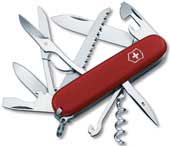 Victorinox Swiss Army Huntsman II Knife
Victorinox Swiss Army Huntsman II Knife
To help find your way on the winding and poorly posted roads of Europe. It works for civilian travelers also.
 Lensatic Military Marching Compass
Lensatic Military Marching Compass
Rolling luggage sure beats lugging a pack on your back.
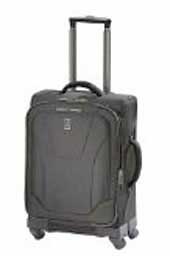 Travelpro Luggage Maxlite 2 20" Expandable Spinner
Travelpro Luggage Maxlite 2 20" Expandable Spinner
A shoulder bag for your daily walk-about.
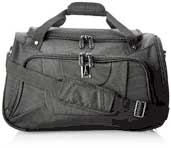 Travelpro Luggage Maxlite3 Soft Tote
Travelpro Luggage Maxlite3 Soft Tote
Keep your stuff organized.

Luggage Packing Cubes
eBags 3pc Set
Plug adapters are needed throughout Europe. There are at least five models used in different countries.
Note: The highlighted #E number is purely arbitrary. It is meant to help quickly identify products in this advert column when you write in for electrical advice.
See NOTE TO READERS.
This adapter is for the standard grounded plug in France, Germany, and northern Europe. It does not fit in outlets of Italy, Switzerland, Ireland, and Britain.
#E-010
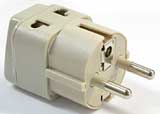 Grounded Universal 2 in 1 Plug Adapter
Grounded Universal 2 in 1 Plug Adapter
European Schuko plug.
4.8 mm prongs.
Equivalent to type E and F.
You can use this ungrounded Euro plug in some European countries.
#E-020
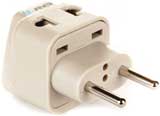 Universal 2 in 1 Plug Adapter
Universal 2 in 1 Plug Adapter
Euro Plug
4.0 mm prongs.
Equivalent to type C.
This is a universal plug adapter for the UK and Ireland.
#E-030
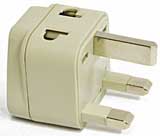 AC Adapter Plug for use in England, Scotland, Wales, and Ireland
AC Adapter Plug for use in England, Scotland, Wales, and Ireland
Equivalent to type G.
Here is the Swiss version.
#E-040
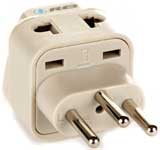 Grounded Universal 2 in 1 Plug Adapter
Grounded Universal 2 in 1 Plug Adapter
Type J for Switzerland
Here is the grounded Italian model.
#E-050
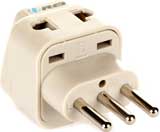 Grounded Universal 2 in 1 Plug Adapter
Grounded Universal 2 in 1 Plug Adapter
Type L for Italy
This 110-250 volt power surge strip has three universal outlets and an American grounded plug so it needs a plug adapter for the countries you are visiting. Make sure your gizmos are rated for 110-240 volts.
#E-060
 SM-60 Universal 3 Outlet Power Strip Surge Protector for Worldwide Travel. 110V-250V with Overload Protection.
SM-60 Universal 3 Outlet Power Strip Surge Protector for Worldwide Travel. 110V-250V with Overload Protection.
If your gizmos charge through a USB port this can keep you going. European cars have the same 12 volt system as American cars.
#E-200
 Scosche Dual USB
Scosche Dual USBCar Charger
The links in this pink field take you directly to a page at Amazon.com. The Amazon page details the item, and in most cases includes candid and critical comments from others who have bought the item.
Amazon pays my site a small commission when you click and order an item, if you put it in your shopping cart within 24 hours based on the cookie they set on your computer. If you don't want to make a quick decision just put it in your shopping cart, think it over, and come back later. The revenue covers the cost of maintaing this web site and keeps it free to users.
You benefit when buying here because Amazon has:
- 20% - 30% discount on many items,
- free shipping deals, direct to your door,
- no sales tax on internet purchases in most states,
- zillions of products, well almost,
- fast delivery even when it is free,
- shipment tracking in UPS, USPS, FedEx,
- easy returns if you are not happy with the product.
You win we win. Thanks for your support!!
Have a good trip in life,
John Bermont
Note: Italicized notations by the author.
For small appliances travelers may find these true transformers useful. They deliver the full sine wave. Caution: The wattage rating is the max short term. For continuous duty I recommend that you select a transformer rated at two times the combined watts of all gizmos plugged it. But check your gizmo's electrical specification plate before buying one of these. Most electronic devices are dual voltage and can be plugged in any European outlet when using the appropriate plug adapter.
This 50 watt 220/110 volt step down transformer is good for very small 110 volt appliances and light duty chargers.
#E-070
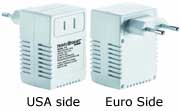 Travel Smart by Conair 50-Watt International Transformer
Travel Smart by Conair 50-Watt International Transformer
This 200 watt step up/down transformer is good for small appliances.
#E-080
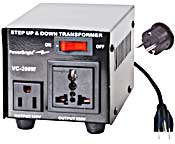 Power Bright VC200W Voltage Transformer 200 Watt
Power Bright VC200W Voltage Transformer 200 WattStep Up/Down
110/120 Volt-220/240 Volt
Absolutely the best battery for digital cameras which use AA batteries.
#E-120
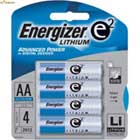 Energizer
EnergizerAA Lithium Batteries
4 Pack
Make sure that your electrical appliances are 110-220 dual voltage so they will work in Europe.
Note:
These appliances require a plug adapter, NOT a converter, for the countries you are visiting. See plug adapters above.
#E-130
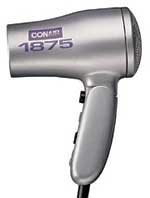 Vagabond Compact Styler
Vagabond Compact StylerConair's Dual-Voltage Ionic Hair Dryer
#E-140
 Conair Flat Iron 2" Ceramic Straightener
Conair Flat Iron 2" Ceramic StraightenerDual Voltage
#E-150
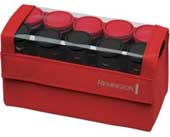 Travel Hair Setter
Travel Hair SetterDual Voltage
Remington H-1015
#E-160
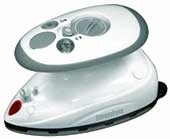 SteamFast SF-717 Home-and-Away Mini Steam Iron (dual voltage)
SteamFast SF-717 Home-and-Away Mini Steam Iron (dual voltage)
#E-170
 Braun Series 1 150 Men's Shaver with Automatic Worldwide Voltage Adjustment
Braun Series 1 150 Men's Shaver with Automatic Worldwide Voltage Adjustment
For light sleepers here is an international "white noise" machine. Includes a Continental plug adapter.
#E-180
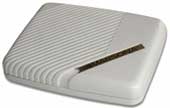 Marsona TSCi-330 White Noise Travel Sound Conditioner For both USA and International
Marsona TSCi-330 White Noise Travel Sound Conditioner For both USA and International
For coffee or tea in your room, without waiting or paying for room service.
#E-190
 Lewis N. Clark Immersion Heater 120/240V
Lewis N. Clark Immersion Heater 120/240V
Wear a money belt under your shirt to protect your passport and valuables, especially if you are staying in hostels or dorms.
 Lewis N. Clark RFID Blocking Waist Stash
Lewis N. Clark RFID Blocking Waist Stash
An RFID blocking wallet protects your passport and credit cards from identity theft in public places.
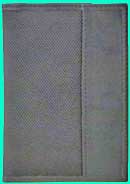 Travelon RFID Blocking Passport Case
Travelon RFID Blocking Passport Case
This will come in very handy very often.
 Fenix LD15
Fenix LD15High Performance
LED Flashlight
Inconspicuously lock your zippered luggage with a black wire tie.
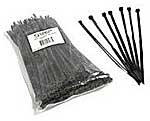 Cables to Go 43036 Cable Ties - 100 Pack (Black)
Cables to Go 43036 Cable Ties - 100 Pack (Black)
One of my favorite books. Ernest Hemingway in Paris.
 A Moveable Feast
by Ernest Hemingway
A Moveable Feast
by Ernest Hemingway
Wear a scarf for comfort and style. Nobody will ever suspect that you are an American.
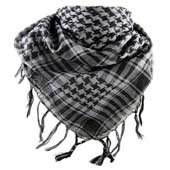 Very soft houndstooth neck scarf. Various colors available
Very soft houndstooth neck scarf. Various colors available
Free to use but not to abuse.
Copyright:
Internet edition
© 2001-2016 James J. Broad
All rights reserved. Tous droits réservés.
This is copyrighted material. Do not reproduce, copy, plagiarize, re-craft,
store, modify, extract, transmit, or purloin any part of this
publication in any nation in any form or by any means or for any purpose whatsoever without permission
in writing.
Copying:
You may print one paper copy of this web page for your personal use.
Permissions:
If you want to adapt any part of this material to use in your blog, forum, web site, book, article,
speech, term paper, movie, video, or any other media please write to me and get
permission before you do so. Otherwise it is a copyright violation or plagiarism.
Plagiarism includes paraphrasing text and copying ideas. Imitation,
the old saying goes, may be the highest form of flattery. However, plagiarism is outright theft and is usually
compounded by the lies of the perpetrator.
Everything on my web site is original, created at great personal expense
in time and cash in the course of my extensive travels throughout Europe. Please respect my property.
For detailed descriptions of the many forms of plagiarism see
Plagiarism.org and
A Plagiarism Guide for Students.
For permission to use material from this web site contact:
[email protected].
Webmasters:
You may link the URL http://www.enjoy-europe.com/hte/chap06/travelsupplies.htm freely. Please do. When you link please send the URL for your linking page and a crosslink will be installed in one of the categories of the TRAVELERS YELLOW PAGES to your site if it has significant content for travelers in Europe.
Free, free, and free
This web site is totally free for everyone, and a labor of love for me.
Support
To keep enjoy-europe.com afloat I advertise scores of travel related books and products. My site receives
a commission from Amazon.com for all goods purchased through the advert links. These advert links are
displayed on individual pages and on my on-line store at
 . Your support is most gratefully appreciated. TIA.
. Your support is most gratefully appreciated. TIA.
Your Blow Back
I welcome questions, comments, and complaints. If you have any concerns about your trip to Europe that have not been covered well enough on my web site please do not hesitate to write. Ask, cuss, discuss, or whatever. I read every email and update my pages when I see a question repeating,
Utilities:
- How To Europe: The Complete Travelers Handbook.
- Home.
- To the top of this page
- E-Mail to John Bermont
- Meet the Author
- Privacy Policy
- Site Map
- Advertising Policy

